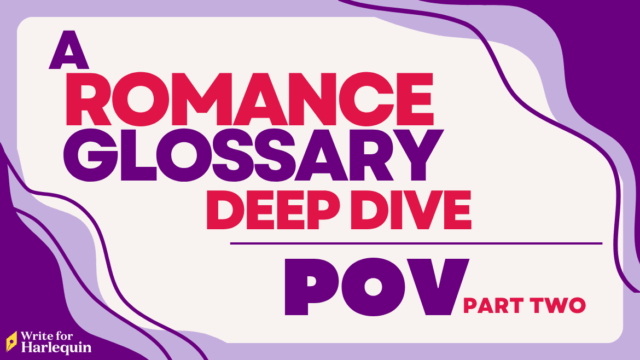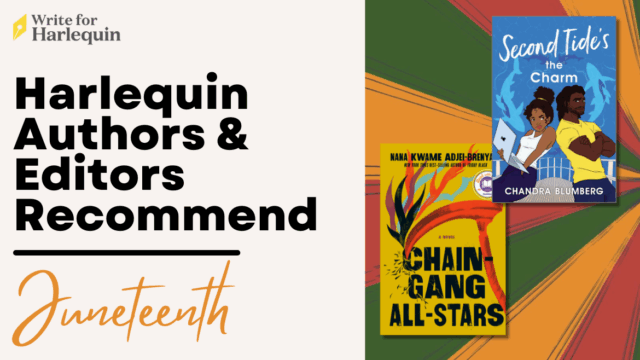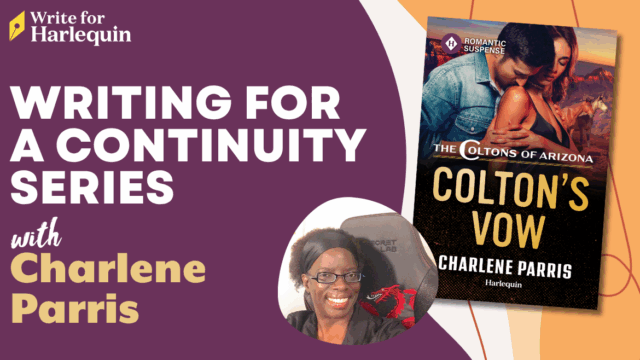There were a few other points to that Q&A that Mary-Theresa Hussey did in 2005. These points might be a bit more dated, but again, they weren’t tweaked or updated, to show that sometimes the advice is given because it lasts. (Again, self-publishing throws some of these points in a new direction!)
Is it important to know what line you’re targeting before you start writing? Why/why not?
If your goal is to write for the joy of writing, for the burst of creativity, for the exploration of an idea or to let loose something that has been bothering you, then you don’t need to worry about anything except the writing. If your goal is to become a published author, I do think that you need to have an idea of where your story might fit before you start, realizing that it might change as it develops and that you might change yourself over the course of your writing career.
But I do think that at the start you need to be aware of who you are writing for. The expectations of a Desire reader are different than those of a Special Edition reader, or even a Blaze reader. Writing for a single title market can leave fewer restrictions, but also makes it more difficult to find a publisher who can imagine the reader for the book. Certainly there is room to explore new levels in all types of stories, but knowing the overall structure (length, pacing, balance of story and characterization, themes and goal) of the story is important to the choices you’re going to make.
Read across the lines, and read across a few months, and you’ll begin to find a consistency of “promise” to the reader. A certain type of story that rings an emotional truth and delivers the escapism, reassurance or excitement to the reader.
One of my favorite responses to ‘those are all formula, right?’ is that poetry must follow a structure as well, hitting the right beats, following an agreed-upon meter and not changing the rules every time–unless, of course, you’ve deliberately chosen an open format. But within that structure, the choice of words, of patterns, of thought, of intention and method make each story different. And yet when writing the poem, you know the outline of what the last word will have to sound like, when you write the first line.
Would the editor of a line know the other lines? (i.e., If I send a novel to a Desire editor which would actually fit better in the Romance series—it’s not sexy enough for Desire—will she know that it meets the Romance criteria? And would she pass it on?)
Certainly the majority of our editors are familiar with the other lines in the company. She may not work closely with the line, or with editors who work on that line, but she will have a sense of the stories that are appropriate to other lines.
And if she feels that a project sent it to her for one line would work better for another line, she has a number of options. She might return the manuscript to the author with a comment/recommendation to target another line, or she might send the manuscript to another editor if she’s very enthusiastic about the project but does not closely work on the line or imprint, or she can decide to work with the author/ manuscript herself and ask for revisions for a more appropriate line or submit the material to the appropriate senior editor of the destination line. Depending on knowledge and experience, all of these options are valid.
In practice, although all editors have a primary responsibility to one line, editors in the New York and UK offices tend to work with authors and projects across more than two series, usually on lines based in their own locations, and editors in the Toronto office tend to focus on one or two lines in their own location. But there are certainly many instances of editors working across series and countries with authors and projects she feels a strong connection to.
So the frustrating, yet honest answer to the question is, “It depends!” And each editor and project might require a different answer. What is consistently true, however, is that as editors we are looking to buy strong books, compelling stories and authors who have long-term possibilities and the more excited we are about the project, the more we will push to have the author’s talents recognized somewhere in the company.
Personally, over the years I’ve bought projects sent in for Desire for the Romance line, Special Edition submissions were acquired for Intimate Moments, and have had IM projects go mainstream! We want good stories and good authors, and often it’s just a matter of the right direction.
Are there many authors who write across lines? To what do you attribute their success in doing this? Is there a learning curve?
There are a fair number of authors who write across lines, and it could be a good or bad thing for an author. We do encourage authors who are starting out to write for one line for at least five or six books in order to build a following and establish a voice. We also want authors who can deliver two or more titles a year to their home line, and still maintain their freshness. Consistency and commitment to a line is generally the fastest and best way to give an author momentum and build her readership.
There are authors who are prolific and innovative enough to write for more than one line. Sometimes it’s for one project that she just can’t get out of her head and is perfect for another line. And sometimes there’s the potential to contribute to two lines on a regular basis and explore two different types of story and readership.
But writing for more than one line can cause frustration for readers who can’t find one of the lines as easily. Or who doesn’t like that type of story. Or who wants more stories told in the original (or second) way. Rather than building a readership, it can cause division, and readers can be hesitant about buying an author for fear they are bringing in other elements.
That’s why we tend to be quite careful about encouraging authors to write for more than one series on a regular and ongoing basis. We want to be sure the author can deliver on the promise of both lines, but also deliver multiple projects a year, or be established enough that readers understand the reasons for the wait. As mentioned above, consistency (as in regular publication), commitment (to quality and craft as well as line and reader) and creativity have to be there for an author to be successful.
Hopefully that was useful as well! The stories and the authors and the editors and readers can change, but there is a promise in a “good story, well-told” that is satisfying for all.
Are there any questions you want answered from someone? Let us know in comments or email SOLD-Blog (@) harlequin.com and we’ll do our best!
Happy writing!




